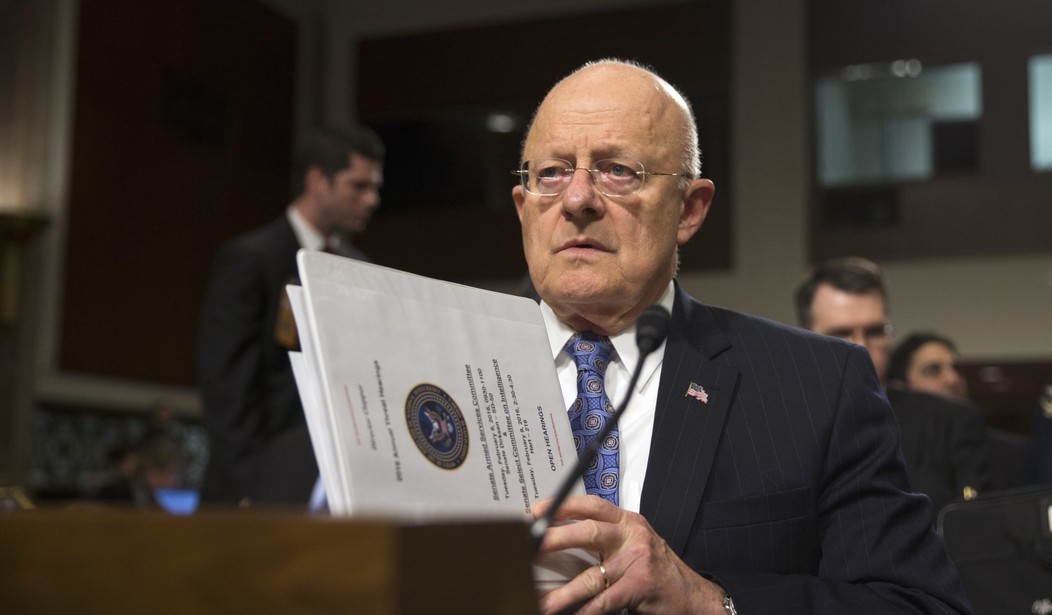WASHINGTON — Director of National Intelligence James Clapper told the House Intelligence Committee this morning that he happily submitted his resignation Wednesday.
Clapper, 75 and fond of quips about his age, had indicated before the election that he planned on leaving his post no matter what. He told the Intelligence & National Security Summit in D.C. in September that “about the only thing we’ll be rolling out the door in the next four months is me.”
At an open hearing today on intelligence community support for the Defense Department, Clapper said, “I submitted my letter of resignation last night, which felt pretty good. I got 64 days left and I think I’d have a hard time with my wife anything past that.”
Rankin Member Adam Schiff (D-Calif.) told Clapper, “I hope that as you look back on your career, you’re — you don’t lament your many appearances before us, we certainly don’t.”
“And you know there was a rumor out there that you might be asked to stay on a little longer during the transition,” Schiff added. “I’m hoping you will stay on a little longer, maybe four years longer. But that’s probably the last thing you wanna hear.”
Chairman Devin Nunes (R-Calif.), who is on President-elect Donald Trump’s transition team for intelligence, launched directly into questions after opening statements without referencing Clapper’s resignation.
Clapper, a former director of the Defense Intelligence Agency and National Geospatial-Intelligence Agency, has led the intelligence community at ODNI since 2010.
“Director Clapper has served our country honorably and with distinction in every capacity requested of him, and I thank him for his service to our nation,” Senate Intelligence Committee Chairman Richard Burr (R-N.C.) said in a statement. “Jim’s depth of experience gave him the unique ability to fully understand the range of challenges to our national security. Amidst evolving challenges from our adversaries, Jim has continued to reinforce our intelligence relationships with our allies and successfully managed the intelligence community enterprise.”
“Those of us who know Jim know he has been looking forward to his retirement for some time, and we wish him all the best,” Burr added.
Clapper reiterated to the House committee that “our nation’s facing the most diverse array of threats that I’ve seen in my 53-plus years in the intelligence business.”
In a prepared statement submitted to the committee, the director stressed that “two-thirds of the nations around the world are at some risk of crisis in the next few years.”
“There are two key factors driving the scope and complexity of unrest which span political, economic, security, cultural, and ethnic sectors: massive humanitarian crises and perpetual regional instability,” he said. “The civil war in Syria, and unrest in other parts of Africa, has created the largest migration of refugees and displaced persons since World War II, resulting in strains on infrastructure and resources throughout Europe, as well as threats to civil and cultural stability. Many migrants and refugees have been able to transit through Libya because of the unrest.”
“We should expect new terrorist entities to arise and a cycle of violent extremism to continue for the foreseeable future, while our more traditional issues like Russia, China, Iran, and North Korea will continue to challenge us.”
Clapper noted that “violent extremism, which has been on an upward trajectory since the late 1970s, has generated more IC collection and analysis against groups, members, and safe havens than at any other point in history.”
“These include the Islamic State of Iraq and the Levant; al-Qaeda with its nodes in Syria, Pakistan, Afghanistan, and Yemen; al-Shabaab, al-Qaeda’s affiliate in East Africa; and Iran, the foremost state sponsor of terrorism, which continues to exert its influence in regional crises in the Middle East through the Islamic Revolutionary Guard Corps Qods Force, its terrorist partner Lebanese Hizballah, and proxy groups.”
It’s critical that the United States “posture ourselves for the ‘new normal’ in the Arab world,” Clapper added, “which brings with it increased instability and violence, and we must help accelerate the transition to a representative government in Syria.”
“Concurrently, nation-state efforts to develop or acquire weapons of mass destruction, their delivery systems, or their underlying technologies constitute a major threat to the security of the United States, its deployed troops, and allies,” he said. “Cyber threats continue to be an area of growing concern. We must defend against a broader array of increasingly sophisticated cyber threats from state and non-state actors.”
China should be expected “to continue to pursue an active foreign policy,” Clapper said, while Russia “seeks to accelerate a shift to a multi-polar world with its military foray into Syria marking its first use of expeditionary combat power outside the former Soviet bloc in decades.”
“We must continue assessing the impact of Russia’s willingness to covertly use military and paramilitary forces in a neighboring state, and the anxieties in states along Russia’s periphery, to include European allies.”









Join the conversation as a VIP Member